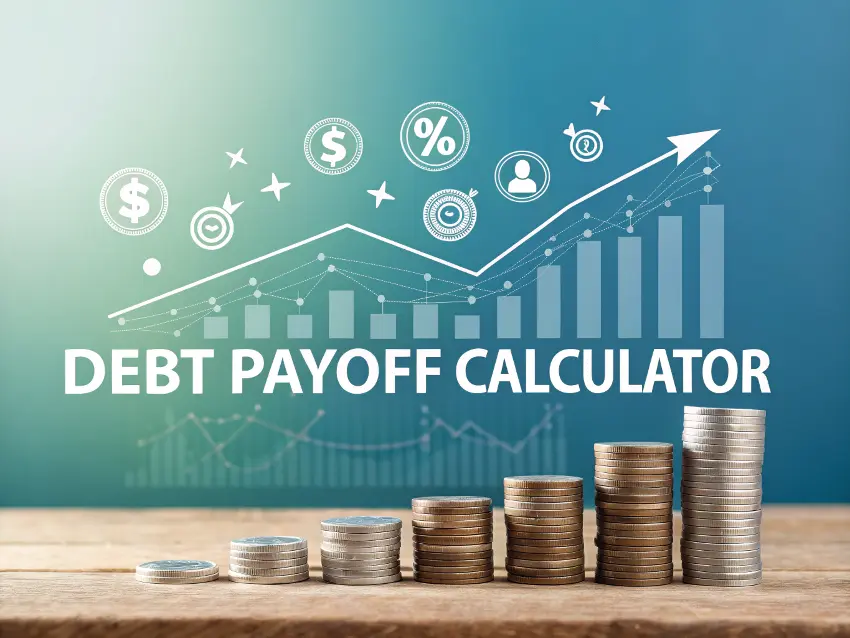Debt Payoff Calculator
Create a plan to eliminate your debt with the snowball or avalanche method

Debt Payoff Strategies
How to Get Out of Debt:
Getting out of debt requires a solid plan and consistent payments. There are two primary strategies to pay off multiple debts efficiently:
Debt Snowball Method
Pay off debts from smallest balance to largest. This creates quick wins and psychological momentum as you eliminate individual debts faster.
Best for: Those who need motivation from seeing progress quickly.
Debt Avalanche Method
Pay off debts from highest interest rate to lowest. This minimizes the total interest paid and is mathematically optimal.
Best for: Those focused on paying the least amount of interest overall.
Custom Order
Choose which debts to focus on first based on your personal priorities or special circumstances.
Best for: Those with specific needs, like paying off a debt with a cosigner first.
How This Calculator Works:
- Enter each of your debts with their current balance, interest rate, and minimum payment.
- Choose a debt repayment strategy (snowball, avalanche, or custom).
- Specify any additional amount you can pay each month above the minimum payments.
- The calculator will show you how quickly you'll be debt-free and how much interest you'll save.
Tips for Success
- Stop creating new debt while paying off existing debt
- Pay more than the minimum whenever possible
- Apply windfalls (tax refunds, bonuses) to debt
- Consider balance transfers to lower-interest options
- Track your progress to stay motivated
Your Debt Payoff Plan
Choose Your Strategy
$
Any extra amount you can pay each month beyond the minimum payments
Your Debts
$
%
$
$
%
$
Debt Payoff Strategies Explained
Comparing the Methods
| Feature | Snowball | Avalanche |
|---|---|---|
| Focus | Lowest balance first | Highest interest rate first |
| Psychological benefit | High (quick wins) | Moderate |
| Financial benefit | Moderate | High (minimizes interest) |
| Time to first payoff | Typically faster | Potentially longer |
| Best when | Motivation is a challenge | Interest rates vary widely |
Additional Debt Reduction Strategies
Debt Consolidation
Combining multiple debts into a single loan with a lower interest rate. This can simplify payments and reduce interest costs, but requires good credit and discipline.
Balance Transfers
Moving high-interest credit card debt to a card with a 0% introductory APR. This provides a window of time to make progress without interest, but watch for transfer fees and the end of promotional periods.
Debt Management Plans
Working with a credit counseling agency to create a repayment plan, potentially with reduced interest rates. This can help with unsecured debts like credit cards.
Debt Settlement
Negotiating with creditors to pay less than the full amount owed. This can reduce debt but may damage credit and have tax implications.
Success Habits for Debt Repayment
- Create a budget: Know your income and expenses to maximize debt payments.
- Build an emergency fund: Even a small one ($1,000) prevents new debt when emergencies arise.
- Cut expenses: Find areas to trim in your budget and redirect that money to debt.
- Increase income: Consider side gigs, overtime, or selling unused items.
- Avoid new debt: Stop using credit cards while paying off debt.
- Automate payments: Set up automatic payments to avoid missing due dates.
- Celebrate milestones: Recognize progress with small, budget-friendly rewards.
Common Questions About Debt Payoff
Should I save for retirement while paying off debt?
It's usually wise to contribute at least enough to get any employer match in retirement accounts while paying off debt. Beyond that, focus on high-interest debt before additional retirement savings.
Which debts should I prioritize?
After making minimum payments on all debts, prioritize debts that are in collections, have legal consequences, or have very high interest rates (like payday loans). Then follow your chosen strategy for the rest.
Is debt consolidation a good idea?
It can be if it lowers your interest rates and you don't accumulate new debt. Be careful about consolidating unsecured debt (like credit cards) into secured debt (like home equity loans) as you risk losing the collateral.
What about student loans?
Federal student loans often have flexible repayment options and forgiveness programs. Research these before prioritizing them over higher-interest debt, unless you're pursuing Public Service Loan Forgiveness.